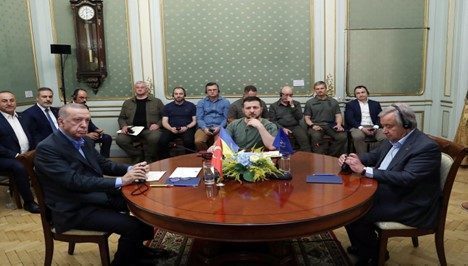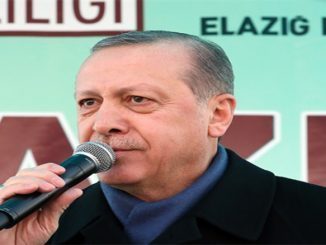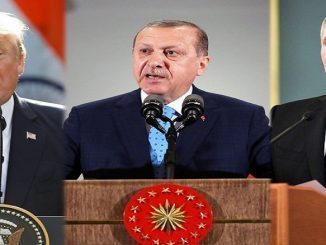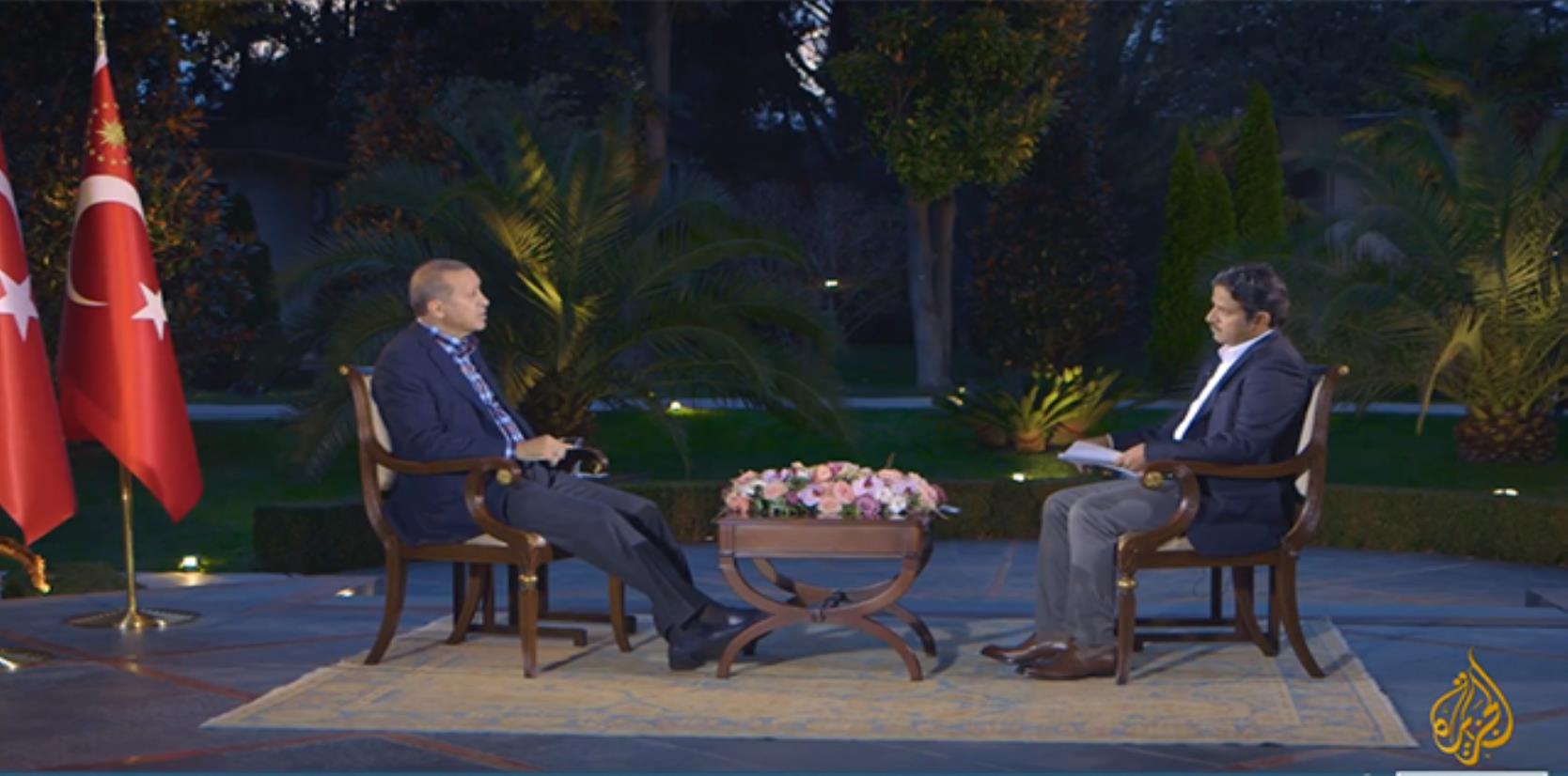
The gathering marks the first visit to Ukraine by the Turkish president since Russia’s invasion on 24 Feb. and the second visit by U.N. Secretary-General
Turkish President Recep Tayyip Erdogan arrived in Ukraine today, Thursday, 18 August, to meet with Ukrainian President Volodymyr Zelenskyy and U.N. chief Antonio Guterres for talks on the recent deal to resume the embattled country’s grain exports, the volatile situation at Europe’s biggest nuclear power plant, and efforts to help end the nearly six-month-old war.
The gathering of the three leaders marks the first visit to Ukraine by President Erdogan since Russia’s invasion on 24 February and the second by U.N. Secretary-General Guterres.
Erdogan was welcomed by Zelenskyy in Lviv, near Ukraine’s border with Poland, where the Turkish leader and his delegation landed before they reached the western city by land.
Talks between the two leaders focused on all aspects of bilateral relations between Ankara and Kyiv.
Zelenskyy praised Erdogan’s visit, dubbing it a “powerful message of support”.
“The visit of the President of Turkey to Ukraine is a powerful message of support from such a powerful country,” he said.
The meeting was followed by a trilateral summit with Guterres, who arrived Wednesday in Lviv, an important transit point for Ukrainian refugees heading west to Europe.
The three leaders were to hold a joint news conference after their meetings.
Last month, Turkiye and the U.N. helped broker an agreement clearing the way for Ukraine to export 22 million tons of corn and other grain stuck in its Black Sea ports since Russia invaded Feb. 24. A separate memorandum between Russia and the U.N. aimed to clear roadblocks to shipments of Russian food and fertilizer to world markets.
U.N. deputy spokesperson Farhan Haq said that among other issues, Guterres would discuss “his overall efforts to do what he can to essentially lower the temperature as much as possible with the various authorities.”
The war and the blocked exports significantly exacerbated the global food crisis because Ukraine and Russia are major suppliers. Turkey is in a position to help speed up exports, which have been reduced to a trickle so far.
Grain prices peaked after Russia’s invasion, and while some have since returned to prewar levels, they remain significantly higher than before the COVID-19 pandemic.
Developing countries have been hit particularly hard by supply shortages and high prices. Even though ships are now leaving Russia and Ukraine, the food crisis hasn’t ended.
Black Sea traffic gains pace
As traffic in the Black Sea gains pace, one more ship carrying grain has left Ukraine’s Chernomorsk port, Turkiye’s Defense Ministry said on Thursday, bringing the total number of vessels to leave Ukrainian ports under the grain deal to 25.
The Belize-flagged I Maria was loaded with corn, the ministry said, adding that four other ships were to arrive in Ukraine’s ports on Thursday to be loaded with grain.
More than 620,000 metric tons of Ukrainian agricultural products have been shipped so far under the wartime deal, it said.
Earlier this week, the first U.N.-chartered vessel laden with grain set off for Africa under the accord, the Ukrainian ministry in charge of shipments said.
Guterres plans on Friday to visit the Black Sea port of Odessa, where grain exports have resumed under the grain deal.
On Saturday, he will travel to the Joint Coordination Centre (JCC) in Istanbul, which is made up of Russian, Ukrainian, Turkish and U.N. officials overseeing the Black Sea exports of Ukraine grain and fertilizer.
U.N. spokesperson Stephane Dujarric told reporters this week that Guterres’ trip to Ukraine would allow him “to see first-hand the results of an initiative… that is so critically important to hundreds of millions of people.”
Dujarric added that he expects “the need for a political solution” to the war to be raised in Thursday’s talks.
He said the three leaders would also discuss the situation at the Russian-controlled Zaporizhzhia nuclear power plant in southern Ukraine, Europe’s largest, which Moscow and Kyiv have accused each other of shelling.
Zelenskyy said after talks with Guterres that the UN must ensure the security of the plant.
He said he and Guterres had discussed the grain deal, and agreed that coordination of efforts under it to ensure Ukrainian exports should continue.
“Particular attention was paid to the topic of Russia’s nuclear blackmail at the Zaporizhzhia NPP. This deliberate terror on the part of the aggressor can have global catastrophic consequences for the whole world,” Zelenskyy wrote on the Telegram messaging app.
“Therefore, the U.N. must ensure the security of this strategic object, its demilitarization and complete liberation from Russian troops.”
In his nightly video address Wednesday, Zelenskyy reaffirmed his demand for the Russian military to leave the plant, emphasizing that “only absolute transparency and control of the situation at and around the Zaporizhzhia nuclear power plant for the Ukrainian state, for the international community, and for the IAEA can guarantee a gradual return to normal nuclear safety.” The International Atomic Energy Agency is a U.N. agency. Russia has rejected the demand.
Balancing act
Erdogan’s office said he would address ways to increase exports of grain and steps that could be taken towards ending the war between Ukraine and Russia through diplomatic means.
Earlier this month, the Turkish leader met with Russian President Vladimir Putin.
In March, Turkiye hosted a round of talks between Russian and Ukrainian negotiators, who discussed a possible deal to end the hostilities. The talks fell apart after the meeting in Istanbul, with both sides blaming each other.
Erdogan has engaged in a balancing act, maintaining good relations with both Russia and Ukraine.
Turkiye has criticized Moscow’s invasion and provided Ukraine with arms, including drones, which played a significant role in deterring a Russian advance early in the conflict, while refusing to join the West in imposing sanctions on Russia – a stance it says has helped its mediation efforts reap results.
Turkiye increasingly relies on Russia for trade and tourism. Russian gas covers 45% of Turkish energy needs, and Russia’s atomic agency is building Turkiye’s first nuclear power plant.
During their meeting in Sochi this month, Putin and Erdogan agreed to bolster energy, financial and other ties between their countries.



